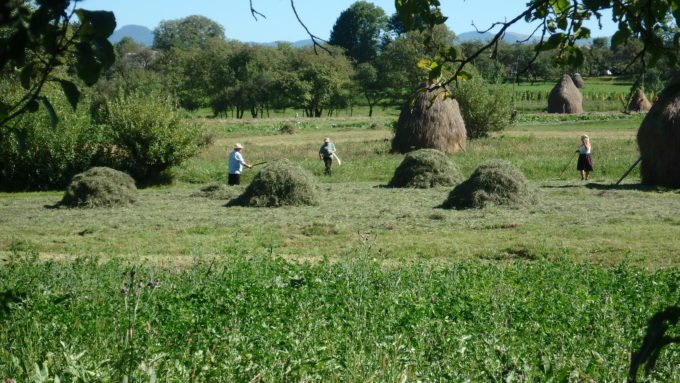
The Best Thing that Can Happen to Fruit in Northern Romania

The Best Thing that Can Happen to Fruit in Northern Romania
Tuică in Romania
“Noroc!”
This was about the only word of Romanian I mastered during my time among the patchwork green hills of the Maramures region in Romania’s far north. (It means cheers, good luck, and bless you, depending on the occasion.)
I’d toss it out at startlingly regular intervals whenever a small glass of homemade țuică was passed my way—starting a meal, finishing a meal, saying hello, saying goodbye, meeting new people, seeing familiar people, and on and on.
While I hear that true țuică is a more specific type of liquor, it seems to be, in this region, somewhat synonymous with horinca and the more generic pálinka, though not as strong. Whatever name it receives, this particular drink is the product of tiny, creek-side distilling shacks.
In a place where villages, communities, and families still meet most of their needs with their own hands, as farmers and craftsmen, they tend to work up a thirst and then sate that need, too, with their own sweat and skill. The mounds of leftover apples, plums, and pears littering every yard and field are gathered up by each family in the late fall.
Some are preserved, some made into juice, but the highest honor for a fruit around here is to be left fermenting through the winter, then hauled to one of the shacks where the local liquor maestro works their magic in the swirling steam to turn mash into fiery țuică.
As it trickles out of the copper spout, it’s collected in clear glass “impossible bottles” that contain a wooden ladder or spindle, hand-carved in the traditional manner used for making entry gates, utensils, even roof shingles. The spindle is, impossibly, much wider than the mouth of the bottle, and tints the liquor with just the slightest color and flavor depending on the type of wood.
One of the elderly village men who practices this craft welcomed me into his woodshop, and demonstrated his techniques, but would not reveal the secret of their assembly.
In exchange for producing the alcohol for them, each family gives the distiller a small percentage of the product.
When I ask my host how they feel about the percentage they have to give to the producer, they show me to their earthen basement, where a shaft of sunlight glints off of more bottles than I can even estimate.
“We have enough,” he smiles and chuckles.
As we amble back to the table for an outdoor dinner, neighbors drop by and the glasses come out. I can smell the alcohol a foot away and try not to cough as I cheerfully put my vocabulary to use. “Noroc!’